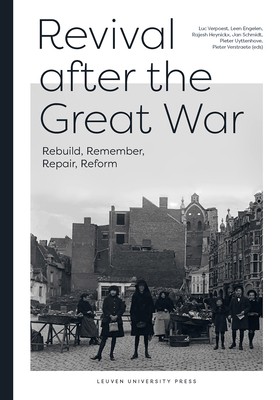
- We will send in 10–14 business days.
- Publisher: Leuven University Press
- ISBN-10: 9462702500
- ISBN-13: 9789462702509
- Format: 15.6 x 23.4 x 1.9 cm, minkšti viršeliai
- Language: English
- SAVE -10% with code: EXTRA
Revival After the Great War (e-book) (used book) | bookbook.eu
Reviews
Description
In the months and years immediately following the First World War, the many (European) countries that had formed its battleground were confronted with daunting challenges. These challenges varied according to the country's earlier role and degree of involvement in the war but were without exception enormous. The contributors to this book analyse how this was not only a matter of rebuilding ravaged cities and destroyed infrastructure but also of rebuilding people's damaged bodies and upended daily lives, and rethinking and reforming societal, economic and political structures. These processes took place against the backdrop of mass mourning and remembrance, political violence and economic crisis. At the same time, the postwar tabula rasa offered many innovative opportunities in various areas of society, from social and political reform to architectural design. The wide scope of postwar recovery is reflected in the different sections of this book: rebuild, remember, repair, and reform. It offers insights into the postwar era in Western European countries such as Belgium, France, Germany, Portugal, Spain, and Italy, as well as into how those efforts were perceived outside of Europe, for instance in Argentina and the United States.
Free ebook available at OAPEN Library, JSTOR and ProjectMuse
Contributors: Helen Brooks (University of Kent), Dries Claeys (KU Leuven), Marisa De Picker (KU Leuven), Leen Engelen (LUCA/KU Leuven), Rajesh Heynickx (KU Leuven), John Horne (Trinity College Dublin), Maarten Liefooghe (Ghent University), Ana Paula Pires (Universidade Nova de Lisboa), Richard Plunz (Columbia University), Tammy Proctor (Utah State University), Pierre Purseigle (University of Warwick), Carolina Garcia Sanz (Universidad de Sevilla), Jan Schmidt (KU Leuven), Yves Segers (KU Leuven), Marjan Sterckx (Ghent University), Maria Inés Tato (Universidad de Buenos Aires), Pieter Uyttenhove (Ghent University), Joris Vandendriessche (KU Leuven), Luc Verpoest (KU Leuven), Pieter Verstraete (KU Leuven), Volker Welter (University of California), Kaat Wils (KU Leuven)
EXTRA 10 % discount with code: EXTRA
The promotion ends in 21d.01:18:18
The discount code is valid when purchasing from 10 €. Discounts do not stack.
- Publisher: Leuven University Press
- ISBN-10: 9462702500
- ISBN-13: 9789462702509
- Format: 15.6 x 23.4 x 1.9 cm, minkšti viršeliai
- Language: English English
In the months and years immediately following the First World War, the many (European) countries that had formed its battleground were confronted with daunting challenges. These challenges varied according to the country's earlier role and degree of involvement in the war but were without exception enormous. The contributors to this book analyse how this was not only a matter of rebuilding ravaged cities and destroyed infrastructure but also of rebuilding people's damaged bodies and upended daily lives, and rethinking and reforming societal, economic and political structures. These processes took place against the backdrop of mass mourning and remembrance, political violence and economic crisis. At the same time, the postwar tabula rasa offered many innovative opportunities in various areas of society, from social and political reform to architectural design. The wide scope of postwar recovery is reflected in the different sections of this book: rebuild, remember, repair, and reform. It offers insights into the postwar era in Western European countries such as Belgium, France, Germany, Portugal, Spain, and Italy, as well as into how those efforts were perceived outside of Europe, for instance in Argentina and the United States.
Free ebook available at OAPEN Library, JSTOR and ProjectMuse
Contributors: Helen Brooks (University of Kent), Dries Claeys (KU Leuven), Marisa De Picker (KU Leuven), Leen Engelen (LUCA/KU Leuven), Rajesh Heynickx (KU Leuven), John Horne (Trinity College Dublin), Maarten Liefooghe (Ghent University), Ana Paula Pires (Universidade Nova de Lisboa), Richard Plunz (Columbia University), Tammy Proctor (Utah State University), Pierre Purseigle (University of Warwick), Carolina Garcia Sanz (Universidad de Sevilla), Jan Schmidt (KU Leuven), Yves Segers (KU Leuven), Marjan Sterckx (Ghent University), Maria Inés Tato (Universidad de Buenos Aires), Pieter Uyttenhove (Ghent University), Joris Vandendriessche (KU Leuven), Luc Verpoest (KU Leuven), Pieter Verstraete (KU Leuven), Volker Welter (University of California), Kaat Wils (KU Leuven)


Reviews